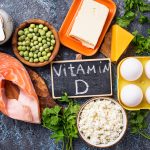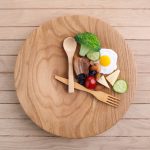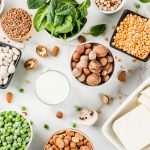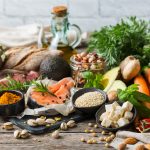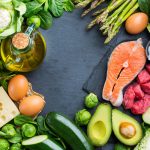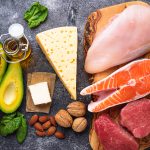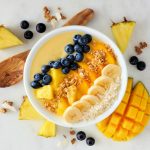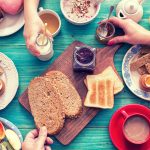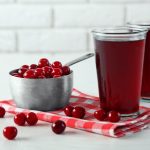Dietitian Shares 5 Ways to Manage Heartburn for a Better Night’s Sleep
Posted by Jessica Penner

If you’ve been suffering from heartburn you know that it can be a real pain in the…
Chest! That’s what you thought I was going to say, right?
It gets worse than that. Unfortunately, if you’re already predisposed to sleeping difficulties, heartburn can be another barrier between you and a good night’s sleep.
Thankfully there are several lifestyle changes that you can try to improve your heartburn symptoms!
Experiment with Meal Sizes
The medical term for heartburn is gastro-esophageal reflux. This is when the contents of the stomach spill back up into the esophagus (the tube that connects your mouth to your stomach). The stomach secretes a strong acid to digest food, so reflux can cause a painful “burning” sensation in the chest.
Some people find that 4-6 smaller meals and snacks throughout the day help with reflux, as the stomach doesn’t get as full “to the brim.”
Other people find that 2-3 larger meals work better for them, as this results in fewer times that larger amounts of stomach acid is excreted.
The only way to figure out which camp you’re in is to experiment and see what works best for you!
Choose Foods to Keep Your Valve Strong
At the top of your stomach, there’s a muscle valve called the lower esophageal sphincter that’s designed to keep the stomach contents from reversing back upwards. For a variety of reasons, this muscle can weaken, and let the acids up.
Here is a list of foods that MAY cause this muscle to loosen. The research on this is mixed. It could be that these foods affect some people differently than others. You could test for yourself, to see if reducing/eliminating some of these foods improves your symptoms.
- Alcohol
- High fat foods
- Large amounts of sugar
- Coffee (with or without caffeine)
- Tea
- Peppermint
- Chocolate
- Garlic and onions
- Spicy foods
On the other hand, the following foods may help to strengthen the valve!
- High protein foods such as lean meat, fish, eggs, cottage cheese, and tofu
- High fibre foods such as whole grains, fruit, beans, nuts, seeds, and fibre supplements
Avoid Trigger Foods
While acidic foods don’t cause reflux, eating and drinking acidic foods and beverages can aggravate pain in an esophagus that is already damaged.
You may want to avoid the following acidic foods to avoid making the pain worse:
- Citrus fruits and juices (oranges, grapefruit, lemon, and lime)
- Fresh and cooked tomatoes and tomato-based sauces
- Carbonated beverages
Chew Your Food Well
Have you ever had that sensation where it feels as though the food you swallowed has gotten “stuck” in your throat? This can happen sometimes when the muscles of the esophagus are having a hard time moving the food down.
It’s more challenging for the esophagus to do its work if you swallow large bites or undiluted bites. Therefore, it’s important to chew food thoroughly, to break it down into smaller pieces and moisten it thoroughly with saliva.
Make Gravity Work For You
There’s a reason that food enters the body at a higher spot than where the undigested portion exits. The body is working with gravity instead of against it! Keep this basic law of physics in mind to help keep your stomach contents moving down your digestive tract instead of up.
- Wait 2-3 hours after eating before lying down.
- Wear loose clothing and undergarments. Even mildly tight clothing can cause an upward pressure.
- Elevate the head of your bed a few inches.
If you don’t want to be up at night, keep those acids down! Use these approaches to lessen your chances of problematic acid reflux. You may have noticed a theme running through this article: each person is unique and finding solutions that work for you will require some experimentation! But, in figuring them out, you will be rewarded in your quest for a good night’s sleep. Good luck!

